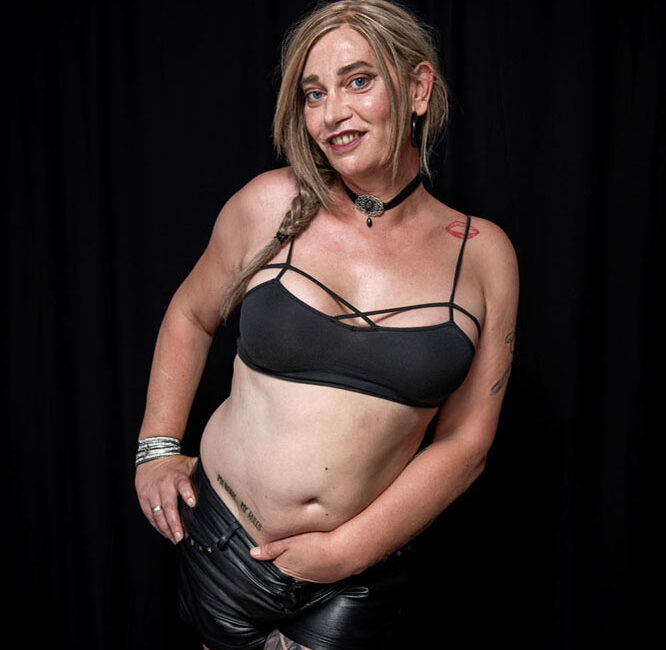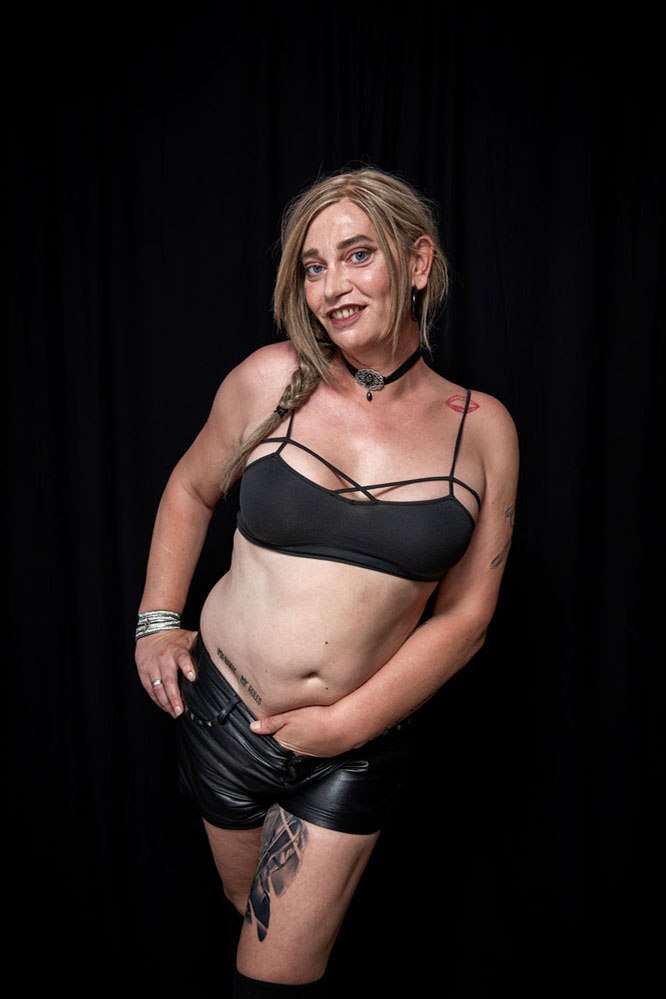
I took portraits of women, trans and non-binary people at leather fetish street-fair FOLSOM Europe in Berlin. My FLINTA* pop-up photo studio was in collaboration with FOLSOM Europe and supported by Other Nature Shop. Our aim was to give space to the underrepresented individuals at this male-dominated event. You can find more portraits at festivals/events.
One of the attendees was politician Tessa Ganserer and she was kind enough to tell us about her opinion.
Interview and text by Rebecca Frances
How is it that we are the weirdos?
For the vast majority of us, what we have underneath our clothes and what we do in the privacy of our own homes is never questioned. We have it. We do it. No-one has a problem with it. And we get to flutter around in ignorant bliss of the socially ratified freedoms that we inhabit by being cis.
Same goes with having a photo taken. I for one, feel no hesitation taking a selfie, or going to a photographer and having some portraits made, or having some random on a beach take a picture of me in a bikini and sticking it up on my Instagram page. In fact, the more I take my clothes off, the more likes I get on my socials, so it even feels like encouragement.
It isn’t that way for everyone.
Tessa is a trans woman. She is a politician. She has a successful career.
“Before my coming out, I was already in the public eye. There are photos of me. The whole world knows I’m trans. And on a personal level, it’s not a problem. Normally, in a cafe or at the doctor I am addressed as the woman that I am. But there is a section of society who just do not accept it.”
I asked Tessa how she knows this, where does she experience this resistance?
“It’s hate, not resistance. I usually experience it online. On Facebook, Instagram, Twitter/X, in emails – I get threats and insults. People feel the need to write something like that to me just because of my physical appearance.”
She talks about how women generally are judged.
“All too often, women are reduced to their appearance. This is a general problem. Comments about their appearance often relativize or distract from women’s opinions or statements. Women are then supposedly too fat, too thin, too boring, too conformist, too revealing, … And as a trans woman, I don’t want to hide. I don’t want to limit myself out of fear of hatred.”
There is something so pernicious here, about the objectification and commodification of women’s bodies, the fetishization of them, and the compound difficulties / injuries / injustices that Tessa and other trans people experience due to a total lack of acceptance.
Tessa is not one to hide.
“I have a tattoo: my body, my rules. And I want to get this message across. I decide what I show of my body. What I have or don’t have in my pants is entirely my business! Taking this photo with Marga was an act of self-empowerment.”
Tessa attended the Folsom Street Fair Berlin, the European version of the legendary BDSM and leather subculture street fair in San Francisco. Marga was there taking portraits of the flinta* attendees, bringing visibility to the event’s smaller community.
“Folsom is very male dominated. It’s fetish. It’s naked. There are people in uniforms and leather and latex and crowds of people celebrating in the streets. You know what? Not a single person has insulted me here. Nobody commented negatively on my body. It’s wild to me that people who attend an event like this, that we at Folsom are considered as perverts by the general public. Have you ever been to the Oktoberfest in Munich?”
The comparison hit me strongly. I had never been to Oktoberfest but Tessa could describe her experience.
“Men pee in the streets, people vomit because they drink too much alcohol. Men harass women. And this is considered acceptable behaviour? Or at least it is considered as normal? The general idea of people involved in fetishism is that they are perverts. For me it is perverse that the conditions at Oktoberfest are viewed as normal by many people, while we are seen as weirdos.”
